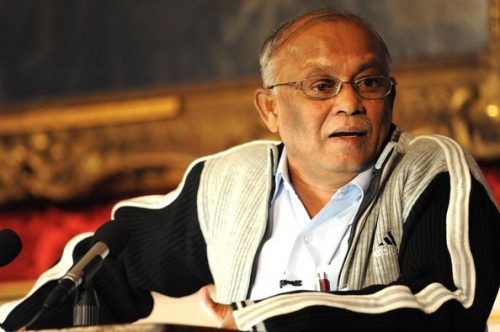Noble Peace Prize nominee, Jockin Arputham talks about the importance of a slum-friendly and just society.
He holds the audience captive with the force of his conviction, his indomitable spirit giving life to his words; his experience is a testimony to the change he has ushered in and his strength is a marker of his perseverance.
Jockin Arputham speaks of the irrefutable, yet hitherto untouched predicament of how rights are believed to be the same for all citizens, but are often found to be acceptable for one group, while being completely dismissed for another.
In the post-independence era, when much had to be done to set up a new country and dismantle the oppressive systems of the previous regime, Arputham took it upon himself to fight for those who couldn’t fight for themselves. His ideas have shaped the lives of those who live in the narrow by-lanes of shanties and those who are the unrecognised life-givers to urban residents.
Arputham became the change that he wished to see. He is revered the world over for his efforts. And yet, should someone ask him who he is, this continues to be his answer: “Jockin, Slum Dweller.”

Twenty-one-year-old Jockin Arputham came to Mumbai in search of better opportunities and a better life. He was a resident of the Janta Colony of Dharavi.
Arputham found the conditions in which this section of the urban populous lived, deplorable and unacceptable. And upon a hill on one fateful day, he decided that something had to be done. This led to a series of events and protests that proved fruitful in bringing tangible changes in the nearby community. With that, he started the Bombay Slum Dwellers Federation in 1975, which later went on to become the National Slum Dwellers Federation.
Today, Arputham is the president of the Slum/Shack Dwellers International, which fights for the rights of the less fortunate in 33 countries in Africa, Asia and Latin America.
India has come a long way since Independence; better education, modernization and industrialization allow the country to offer the best of the world’s facilities to its people.
But a walk in the lanes of the Paharganj Slums of New Delhi or Dharavi in Mumbai will tell you a different story. While a large chuck of our population demands sanitation, shelter and security as a basic right, there is another world of 65 million people in our own cities to whom these amenities seem more like luxuries.
Bricks and mortar don’t make a society worth living in; people do.
“People think that slum dwellers are a menace; lazy, eating whenever they want, drinking whenever they want, wasting resources. Who brings you your morning tea? Who knows the right dosage of medicine for your children? Your servants. And where do your servants come from? The dirty slum,” says Arputham.
Arputham’s questions bring into focus why we, the more privileged, frown upon those who serve us.
“Their needs are not any different from ours – clean drinking water, toilets and a roof over their heads, without the threat of it being bulldozed the next morning,” says Arputham.
What would make things different is our perception of who slum dwellers are.
Unlike most of us, slum dwellers don’t have a 9 to 5 job. It’s a daily struggle to keep a roof over their head and to fill their children’s bellies. When Arputham calls for change, he calls for a change in outlook and action; a change in how fellow citizens should treat one another; a change in how the system shall recognize these individuals.
India’s metros have become a sullied example of the chasm that exists between the rich and the poor; of how some can live so large and leave so little for the rest. Ironically, it is this chasm that binds these cities together. Without them, most of us won’t be able to work on our priorities, and without us, they won’t have a livelihood. So why the disdain to another fellow citizen who’s trying to make ends meet, much like you and I?
Through his speech and his actions, Arputham has illustrated that the value of a human being is much greater than the material luxuries the world has to offer, which, these days, is the yardstick by which people measure an individual. He only asks for all people to be treated fairly. His dream is to see a slum-friendly society.
Arputham attributes much of his success to the women who have supported his efforts. “I’m running this organization because of the strength of the women. In India itself, more than 10-12 lakh women are members. Men are good bullies; they tend to take the credit, even if women run the show,” he says.
Arputham has been decorated with various awards, including the Magsaysay Award. He was even nominated for the Nobel Peace Prize. He is a man of the masses and continues to work for the welfare of society.
To learn about similar inspiring changemakers, follow us here and here.
Like this story? Or have something to share? Write to us: contact@thebetterindia.com, or connect with us on Facebook and Twitter (@thebetterindia).
If you found our stories insightful, informative, or even just enjoyable, we invite you to consider making a voluntary payment to support the work we do at The Better India. Your contribution helps us continue producing quality content that educates, inspires, and drives positive change.
Choose one of the payment options below for your contribution-
By paying for the stories you value, you directly contribute to sustaining our efforts focused on making a difference in the world. Together, let's ensure that impactful stories continue to be told and shared, enriching lives and communities alike.
Thank you for your support. Here are some frequently asked questions you might find helpful to know why you are contributing?

